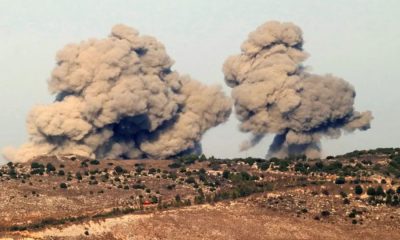International
Israel insists on harsh response to Hezbollah
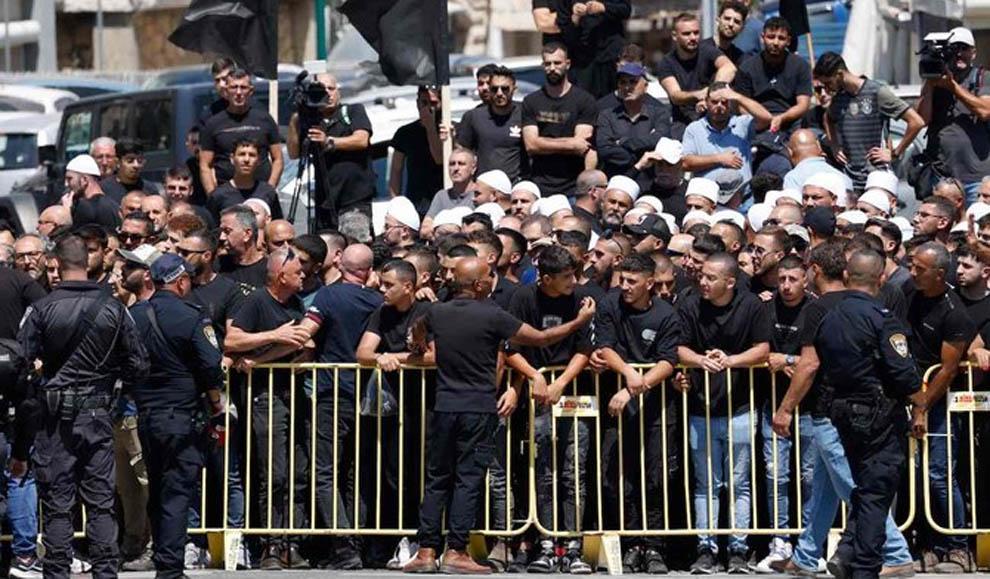
Israel insists on harsh response to Hezbollah
BEIRUT: Political and diplomatic communications have intensified between Lebanon and other nations to mitigate the serious escalation between Hezbollah and Israel.
The communications aim to prevent Lebanon from entering into an open conflict, particularly in light of Israel’s decision on Sunday night to strike Hezbollah in response to what it deemed “Hezbollah’s responsibility for the shelling of Majdal Shams.”
Hezbollah has denied responsibility for the attack on Majdal Shams that killed 12 teenagers and children on Saturday.
A Lebanese government source said that “international communications” had so far succeeded in containing an all-out war.
Israeli army spokesperson Avichay Adraee stated: “Our response to Hezbollah will be clear and strong.”
A Lebanese security source confirmed that Hezbollah evacuated several key points in the south and Bekaa since Sunday, near the Lebanese-Syrian border and the vicinity of Sayyida Zainab in Syria, “in anticipation of an Israeli strike.”
Lebanon witnessed a state of anticipation and caution on Monday, especially in the southern regions, the Bekaa, and Beirut.
Movement remained relatively cautious on roads connecting the regions.
The announcement that some airlines were suspending their flights to Lebanon further increased caution.
Foreign ministries, instead of embassies, warned their citizens to leave Lebanon immediately or “prepare for long periods of shelter.”
Caretaker Prime Minister Najib Mikati received a call from British Foreign Secretary David Lammy, who renewed “the call on all parties to exercise restraint to prevent escalation.”
Lammy stressed the need to “resolve disputes peacefully and through the implementation of relevant international resolutions.”
READ ALSO:
- Israel minister urges NATO to expel Turkey over threat
- Wigwe University Registrar dies in Abuja hospital
- Forty-five killed, dozens trapped in India landslides
Reuters reported that US Secretary of State Antony Blinken called Israeli President Isaac Herzog and emphasized “the importance of preventing the escalation of conflict after the missile attack in the Golan Heights.”
According to Reuters, Blinken and Herzog discussed “a diplomatic solution that allows residents on both sides of the Israeli-Lebanese border to return to their homes.”
Reuters quoted an Israeli official as saying: “We want to harm Hezbollah, but we are not seeking a full-scale regional war.”
The hostile operations between Hezbollah and the Israeli army did not stop on Monday.
An Israeli raid in the morning targeted two locations.
The first raid targeted a car near Shaqra, and when a motorcycle arrived at the scene, it was targeted by a second raid.
This resulted in the death of two people and the injury of three others, including a child.
Hezbollah mourned its two killed members, Abbas Salami, aged 34, from the town of Kharbat Salem, residing in the town of Shaqra, and Abbas Hijazi, aged 29, from the town of Majdal Salem.
Israeli airstrikes hit Houla, with Israeli artillery bombarding the outskirts of Aitaroun.
Residential areas to the south of Mays Al-Jabal were also hit by artillery and phosphorous shells, resulting in fires.
The outskirts of Markaba, Rab El-Thalathine, and Kafr Hamam were also attacked.
The Israeli army conducted a sweeping operation toward Kafr Kila from its outposts in the settlement of Metula using automatic weapons.
Hezbollah continued attacking Israeli positions.
The Al-Manar channel — affiliated with Hezbollah — reported that “large fires broke out in the forests surrounding the settlement of Kiryat Shmona after missiles fell in the area.”
Hezbollah said it targeted the Al-Baghdadi site with dozens of Katyusha rockets.
It also targeted the Israeli soldiers’ position at the Al-Raheb site with guided missiles.
Israeli media reported the fall of several rockets at the Hagoma junction in Upper Galilee.
Israeli Defense Minister Yoav Gallant reiterated the Israeli threat that Hezbollah “will pay a heavy price, and we will let actions speak, not words.”
On Monday afternoon, Middle East Airlines’ aircraft landed on the runways of Rafic Hariri International Airport in Beirut after their flights were suspended on Sunday night.
The airline attributed the irregularity in its flight schedules to “insurance risks.”
The airport witnessed a rush of passengers arriving in Lebanon, mostly Lebanese expatriates, while others were departing.
READ ALSO:
- Ahmed Musa named Kano State Sports Ambassador
- Lagos bus driver accused of stealing N25m solar panels arranged
- Thousands of dollars taken out of Nigeria every hour – INTERPOL
Hala, an employee at the reception area at the airport, told Arab News: “When we ask arriving passengers if they are afraid to come to Lebanon, they laugh and continue to walk.”
The US Embassy in Lebanon, in a video clip by Assistant Secretary of State for Consular Affairs Rena Bitter, advised American citizens to “develop a crisis plan of action and leave before the crisis begins.”
Bitter stressed: “Washington is laser-focused on Lebanon. The US Department of State has no higher priority than the safety and security of US citizens overseas.”
She reminded US citizens of key points on crisis preparedness so they could receive direct alerts from the embassy.
She said: “Regularly scheduled commercial transportation is always the best option, while local communications and transportation infrastructure are intact and operating normally.
“Please ensure your US passports are valid for at least six months. Should commercial airlines not be available, people should be prepared to shelter in a place for long periods.”
The Italian foreign minister also urged Italian nationals to leave Lebanon, while the German government spokesperson advised German citizens to “urgently leave Lebanon.”
The Lufthansa Group, which also includes Swiss International Air Line and Eurowings, said in a statement that it would “suspend flights to Beirut until Aug. 5 due to the current situation in the Middle East, and as a precautionary measure.”
Air France and Transavia suspended their flights to Beirut until Wednesday.
Saudi Arabia urged its citizens to “adhere to the decision of not traveling to Lebanon.”
Royal Jordanian Airlines suspended its flights to Beirut.
Turkish Airlines canceled two flights to Beirut.
Turkish low-cost carrier SunExpress, Turkish Airlines’ AJET, Greece’s Aegean Airlines and Ethiopian Airlines also canceled flights.
Israel insists on harsh response to Hezbollah
ARAB NEWS
International
2 Nigerians in US face heavy jail term over fraud

2 Nigerians in US face heavy jail term over fraud
Two Nigerian nationals based in the United States, Solomon Aluko and Nosakhare Nobore, alongside four others, are facing a possible 62-year prison sentence each after being arraigned before a New York court for allegedly defrauding the U.S. government of $50 million.
It was gathered from a court document obtained on the US Department of Justice website on Sunday that the suspects were arraigned on four counts bordering on conspiracy to commit wire fraud and bank fraud, conspiracy to commit money laundering, engaging in a monetary transaction in property derived from specified unlawful activity, conspiracy to defraud the government, and aggravated identity theft.
The court document indicated that the suspects committed the offences between March 2020 and March 2025, in the Southern District of New York and across other places in the US.
The charge sheet noted that “the defendants, and others, worked together to steal money that did not belong to them by passing counterfeit, stolen, and fraudulently obtained cheques. They submitted the cheques to banks and then withdrew or transferred funds before the banks could determine that the cheques were counterfeit, stolen, or fraudulent.”
According to the document, the defendants allegedly stole information and identities of different individuals and businesses and used the information and identities to open bank accounts through one of their members, who was a bank teller at the time.
The bank accounts were allegedly used to deposit fraudulently obtained cheques from different US agencies.
It continued, “Once the cheques were deposited, the defendants withdrew the fraudulently obtained funds in cash or transferred them to other bank accounts under their control.
“Throughout their scheme, the defendants attempted to obtain approximately $80 million in total. They succeeded in depositing approximately $50 million.”
In a statement accompanying the document on the DoJ website, it was revealed that the suspects created a ‘fraud bible’, which contained specific instructions on how each member of the syndicate would operate.
READ ALSO:
- Canada denies 13,000 Nigerians refugee status
- Lagos Govt to redesign Oshodi motor park for rail integration
- Nurse punished in UK for addressing convicted transgender paedophile as ‘Mr’
- Ex-LG chair challenges El-Rufai’s claims on council funds
It further noted that the syndicate also openly communicated its operations via a Telegram group where discussions on their operations were held.
Commenting on the activities of the syndicate, the statement quoted the US FBI Acting Assistant Director, Leslie R. Backschies, as saying, “These six defendants allegedly used sham businesses, stolen, and fake identities to operate a multi-year cheque fraud scheme, resulting in $50 million in illicit funds being deposited into their accounts.
“The defendants brazenly attempted to exploit multiple United States government programmes in their attempts to illegally enrich themselves. The FBI will continue to ensure fraudsters attempting to lie, cheat, and steal from the government answer for their crimes in the criminal justice system.”
Similarly, the US IRS Special Agent in Charge of the case, Harry Chavis, said, “This group of suspects openly communicated about their fraud, taking pride in the multiple schemes that stole nearly $50 million from the American public.
“They lied and cheated a benefits system meant to help struggling businesses that need it, all while stealing cheques from agencies that assist the elderly and veterans. This gang of ‘bag hunters’ will now face justice for multiple charges.”
Following their indictment, the statement noted that the suspects could be sentenced to 62 years imprisonment each for the four counts.
It acknowledged that the defendants were presumed innocent until proven guilty by the court.
“Anand, 34, of Queens, New York; Nobore, 29, of Edgewater, New Jersey; Pappas, 28, of Miami, Florida; Ujkic, 44, of Ft. Lauderdale, Florida; Aluko, 29, of Hackensack, New Jersey; and Gonzalez, 28, of North Bergen, New Jersey, are each charged with conspiracy to commit wire fraud and bank fraud, which carries a maximum sentence of 30 years in prison; conspiracy to commit money laundering and engaging in a monetary transaction in property derived from specific unlawful activity, which carries a maximum sentence of 20 years in prison; conspiracy to defraud the government, which carries a maximum sentence of 10 years in prison; and aggravated identity theft, which carries a mandatory sentence of two years in prison.
“The maximum potential sentences are prescribed by Congress and are provided here for informational purposes only, as any sentencing of the defendants will be determined by a judge.
“The charges contained in the indictment are merely accusations, and the defendants are presumed innocent unless and until proven guilty,” the statement concluded.
2 Nigerians in US face heavy jail term over fraud
(Punch)
International
Canada denies 13,000 Nigerians refugee status

Canada denies 13,000 Nigerians refugee status
Over 13,000 Nigerians who applied for refugee protection in Canada from January 2013 to December 2024 were rejected.
According to data from the Refugee Protection Division (RPD) of the Immigration and Refugee Board of Canada, this figure includes 811 Nigerians whose applications were turned down in 2024.
The board placed Nigeria among the top five countries with the most rejected claims.
Mexico tops the list with 2,954 rejections, followed by India and Haiti, which have 1,688 and 982 rejected claims, respectively.
Colombia is in fourth place with 723 rejected claims, while Nigeria is in fifth place with 13,171 rejections.
In Canada, asylum seekers get refugee protection if the RPD satisfactorily confirms that their claims meet the United Nations definition of a Convention refugee.
In its definition of the Status of Refugee, the 1951 UN Convention states refugees are persons who have a substantiated fear of persecution because of their race, nationality, religion, political ideology or membership in a particular social group, which can include sexual orientation, gender identity, being a woman and persons living with HIV/AIDS.
READ ALSO:
- Lagos Govt to redesign Oshodi motor park for rail integration
- Nurse punished in UK for addressing convicted transgender paedophile as ‘Mr’
- Ex-LG chair challenges El-Rufai’s claims on council funds
However, in Canada, asylum seekers are expected to show evidence that they are in danger of torture, risk to their life or risk of cruel and unusual treatment or punishment if they return to their country of nationality.
According to the Refugee Board’s application guideline, if an applicant’s “claim is eligible, it is sent to the RPD to start the claim for refugee protection process.”
The breakdown of the rejections showed that 127 Nigerian claims were rejected in 2013, 241 in 2014 and 248 in 2015.
Canada denies 13,000 Nigerians refugee status
International
Nurse punished in UK for addressing convicted transgender paedophile as ‘Mr’
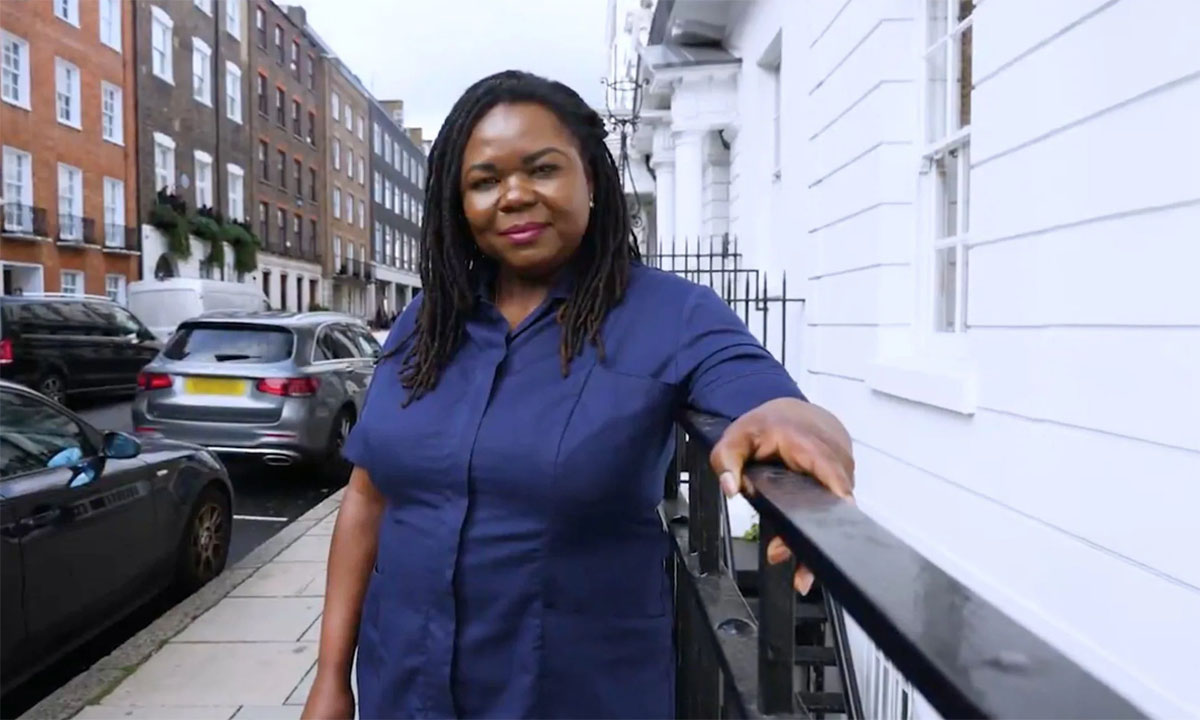
Nurse punished in UK for addressing convicted transgender paedophile as ‘Mr’
A senior nurse in the UK is battling to save her career after facing disciplinary action for refusing to refer to a convicted child sex offender as a woman.
Jennifer Melle, 40, from Croydon, was working at Epsom and St Helier University Hospital Trust when she declined to use female pronouns for a paedophile known as ‘Mr X,’ per report from the London Standard.
The offender, currently serving time in a high-security male prison, was jailed for grooming boys online while posing as a teenage girl.
Following her refusal, Melle claims she was subjected to racial abuse and physical threats.
She was, reportedly, then issued a final written warning and referred to the Nursing and Midwifery Council (NMC) for allegedly breaching professional standards.
READ ALSO:
- Ex-LG chair challenges El-Rufai’s claims on council funds
- Some ladies in movie industry ready to sleep their way to fame — Jide Kosoko
- Gunmen abduct Catholic priest in Anambra
NHS lawyers argued that Melle’s Christian belief—that people are born male or female—was “not worthy of respect in a democratic society.”
An internal investigation found she had violated the NMC Code of Conduct by failing to respect the patient’s “preferred identity” and uphold the Trust’s core value of “Respect.”
As a result, Melle has been moved to another ward, which she says is a demotion, and has had her name removed from internal hospital systems, preventing her from applying for additional shifts.
Now, with the backing of the Christian Legal Centre, she has launched legal action against the Trust, alleging harassment, discrimination, and breaches of her human rights.
The case comes amid growing controversy over gender policies in public institutions.
A recent report, the Sullivan Review, revealed that UK police forces have been allowing criminals to self-identify their gender on official records, sparking nationwide debate.
Nurse punished in UK for addressing convicted transgender paedophile as ‘Mr’
-

 metro2 days ago
metro2 days agoNatasha: Court blocks recall attempt, stops INEC
-

 Sports2 days ago
Sports2 days agoOdegbami speaks on Osimhen breaking his 44-year goals record
-

 Entertainment2 days ago
Entertainment2 days agoI didn’t snatch Asake’s mother from her husband -Musibau Alani
-

 Entertainment1 day ago
Entertainment1 day agoSome ladies in movie industry ready to sleep their way to fame — Jide Kosoko
-

 metro2 days ago
metro2 days agoOluwo accuses Ooni of plotting to dethrone him
-

 metro2 days ago
metro2 days agoBoko Haram attacks military base in Adamawa
-
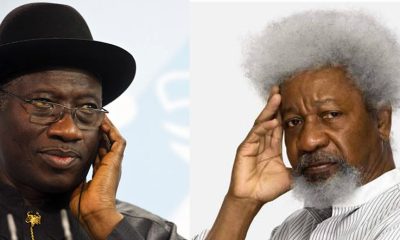
 metro1 day ago
metro1 day agoPresidency blasts Jonathan, Soyinka over comments on emergency rule in Rivers
-
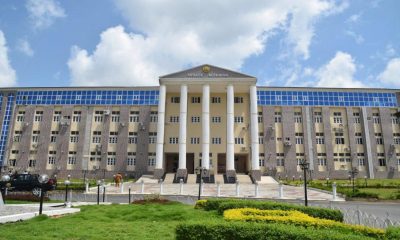
 metro1 day ago
metro1 day agoAdeleke University didn’t suspend Muslims for praying – MSSN



